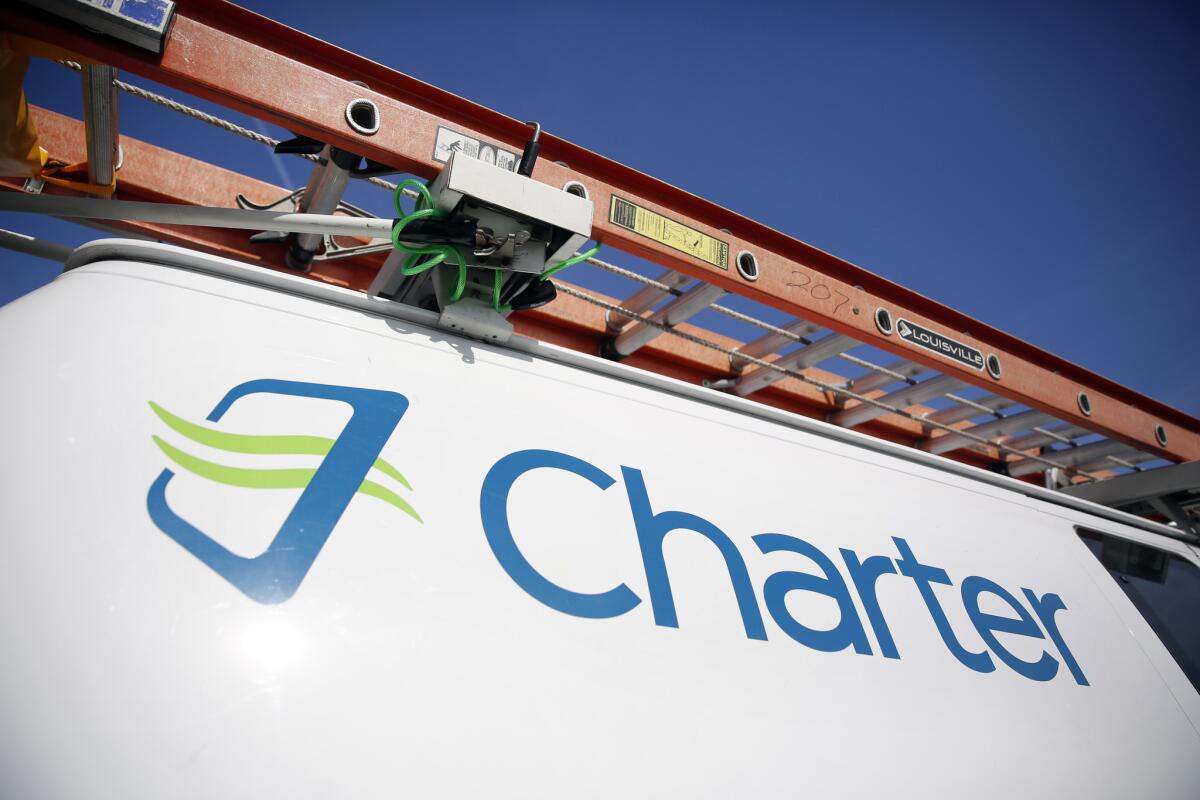California regulators approve Charter’s takeover of Time Warner Cable

- Share via
Charter Communications has cleared a final regulatory hurdle in its nearly year-long quest to clinch its $71-billion acquisition of Time Warner Cable and Bright House Networks.
California Public Utilities Commission members on Thursday voted unanimously to approve the transfer of phone licenses, a blessing needed by Charter to complete the merger of three cable companies.
Charter is expected to finalize the Time Warner Cable and Bright House transactions next week, and then work to consolidate its cable systems nationwide. The Federal Communications Commission approved the deal last week after attaching several conditions aimed at expanding the availability of broadband Internet to begin to close the so-called digital divide.
The FCC also won a pledge from Charter that it would not try to thwart the development of video streaming services.
Charter will become the largest Internet service and pay-TV provider in Southern California with more than 2 million customer homes. It also will become a major provider in New York, Dallas and parts of Florida.
“We are pleased to have now obtained all approvals,” Charter Chief Executive Tom Rutledge said in a statement. “We look forward to closing these transactions next week and to begin delivering the many benefits of these transactions to consumers.”
California PUC members applauded Charter for agreeing to lay cable lines in some geographic regions without lines and for establishing a program to offering affordable Internet service for low-income families with children and low-income seniors.
Charter also committed to rolling out higher Internet speeds to its customer base, a pledge embraced by several PUC members.
“This is going to be critical for economic development in this state,” Commissioner Carla J. Peterman said during Thursday’s PUC meeting, which was held in Sacramento.
Peterman noted that Charter was more cooperative than was the Philadelphia cable company, Comcast Corp., which failed last year in its push to purchase of Time Warner Cable after it ran into a regulatory buzzsaw.
“I expect Charter to live up to the agreements and be a good corporate citizen in California for years to come,” Commissioner Mike Florio said Thursday.
State and federal reviews sought to address the so-called digital divide, recognizing the Connecticut company was poised to become the nation’s second-largest high-speed Internet provider, behind Comcast.
See the most-read stories this hour >>
Federal regulators tailored several conditions to address Charter’s rising Internet clout -- requiring Charter to expand broadband service in areas with spotty service and to sign up poor families who cannot afford Internet service. Charter pledged to provide low-cost Internet service to at least 525,000 low-income homes nationwide.
In addition, Charter agreed not to impose data caps on its customers nor institute usage-based fee structures for at least three years.
Another provision would require Charter to comply with the FCC’s Open Internet rules that require Internet service providers to all treat traffic equally.
In the state of California, Charter will be obligated to build at least 150,000 new line extensions in California and bring broadband service to regions, such as in San Bernardino County, that currently have areas that lack coverage.
“There is an absolute imperative in closing the digital divide,” community activist Larry Ortega from Pomona told PUC members in Sacramento. “Right now, there are 2 million children in California without Internet access.”
Ortega said that Charter’s proposal to provide affordable Internet service did not go far enough to meet pressing needs in Southern California.
As part of the federal requirements, Charter also was tasked with providing 1 million new Internet connections in areas where other high-speed operators deliver service in an effort to encourage more competition.
See more of our top stories on Facebook >>
MORE COMPANY TOWN NEWS
Songkick suffers a setback in its legal battle with Ticketmaster
‘60 Minutes’ correspondent Morley Safer is retiring from CBS News
Follow me on Twitter: @MegJamesLAT
More to Read
From the Oscars to the Emmys.
Get the Envelope newsletter for exclusive awards season coverage, behind-the-scenes stories from the Envelope podcast and columnist Glenn Whipp’s must-read analysis.
You may occasionally receive promotional content from the Los Angeles Times.







